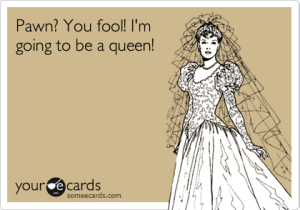K.L. Clark's Blog, page 6
August 19, 2012
IT’S FICTION!!! But is it history?
The Kingmaker’s Daughter by Philippa Gregory
I’ve never read a book by Philippa Gregory before. No, really, I haven’t. I’ve taken peeks at several and come to the conclusion that they weren’t my cup of tea. I resisted The White Queen and The Red Queen and the preposterously titled Lady of the Rivers, but when it came to the Nevills, I found I couldn’t just close my eyes to the existence of The Kingmaker’s Daughter. So I ordered a copy for my kindle and I read it.
I really hoped I’d be pleasantly surprised. I wasn’t.
I wrote a piece a little while ago about historical fiction, specifically mediaeval, with female 1st person narrators. The Kingmaker’s Daughter did nothing to make me rethink any of it. I suggested that writers should read as many primary documents as they could get their hands on. In her references, Gregory mentions two. Anne Nevill tells the whole of the story, which involves a lot of breathless messengers and other characters telling her what’s been going on, we rarely see any of it happening. The book was full of forebodings, presentiments and foreshadowing – every time something went badly in the actual history, Anne or her sister, or someone, knows it was going to go badly. It gets a little wearying after a while.
When it comes to her characters, it’s as if Gregory sent a bulk order to some One Dimensional Character warehouse and unpacked them from their boxes, one at a time. The Bad Queen, the Coldhearted Mother, the Spiteful Sister, the Uncaring Husband, the Ambitious Father, the Beautiful Witch, the Pawn… And each of them has a little bag of Wash ‘n’ Wear Emotions to try on every now and then. The Spiteful Sister pulls on a white shroud and stands up – “Now, I’m going to do Grief” and off she goes.
The dialogue doesn’t sparkle or crackle. The characters spend a good deal of time telling each other what’s going on. There’s very little that could be called ‘intimate’ dialogue. And is it just this book, or does Gregory have difficulty with scenes containing more than two characters?
Little bits of the history are wrong enough to be irritating. Warwick was never known as ‘the kingmaker’ in his lifetime, whatever is claimed in the Author’s Note. Isobel was in Exeter when the Shit Hit the Fan, not Warwick Castle. Her dead son was buried at sea, with all that suggests – priests and a funeral, hurried though it might have been – not put in a box and tossed into the sea. The nephew of Warwick’s who was made Duke of Bedford and betrothed to Elizabeth of York was George, not John. Jaquetta Wydeville dies before her time. Anne takes her sister’s children into her home after her death. Anne’s mother, she tells us, was ‘wedded and bedded’ by the time she was fourteen. Wedded, yes, but bedded… who by? Her eleven year old husband? And there are others. Minor points for many, matters of some irritation for me.
Gregory seems to be of the opinion that all rumours must have basis in fact. George duke of Clarence, possibly in the depths of grief, believed his wife had been poisoned – therefore, she must have been poisoned. Jaquetta Wydeville was tried for witchcraft – therefore she must actually be a witch. With actual magic powers. Whistling up her ‘witch’s wind’ – mentioned ad nauseam – to blight the lives of Anne and her sister. Richard III was rumoured to be planning to marry his niece – therefore he must have had the hots for her. And so on. Maybe it takes a better writer than Gregory to have characters believe something to be true, believe in the reality of witchcraft, without making the reader believe it all as well.
The main character, Anne Nevill, is so very tedious that I found myself wanting to slap her. She cares about nothing and no-one but herself. Her father dies, she slaps on the My Father Died! emotion briefly, but I really didn’t get the sense that she gives tuppence. Her first husband comes into her life, ignores her, does his ‘duty’ by her at night, and is killed. And we don’t get any sense of how any of this affects her. In fact, we don’t really get a sense of how anything affects anyone. Various people are placed in scenes, given non-sparkling dialogue, they get to emote for a moment or two, then we move on to yet more of Anne’s explicatory inner monologue. I prefer a story to be carried by dialogue and action, rather than pages of explication, but that’s a matter of personal taste and preference. Many readers will, I’m sure, love it.
The characterisation and treatment of the Countess of Warwick left me shaking my head. Not only is she the coldest of Coldhearted Mothers, she tells her daughter things that her daughter must already have known, and, when the writer no longer has a use for her, she’s shuffled into a tower at Middleham and forgotten. My sympathy for Anne, never robust at the best of times, evaporated at this point. She is such a namby-pamby whiner.
Warwick himself, such a big character in life, is… nothing. I found this most perplexing. With Warwick, love him or hate him, a writer has such wonderful raw material to work with and Gregory made virtually nothing of him. No wonder his daughters have almost no reaction to his death. I was expecting Shouty Warwick (because he usually is in novels, whether I agree or not) and instead I got Non-entity Warwick. Which left me baffled and deeply disappointed.
Events whizz by so fast they left me dizzy. “You should be king!” Anne says to her husband and – just like that – he is king. “Oh, I had to kill some people, but hey ho!” he says. (Well, not quite…)
Some important characters were inexplicably missing, and some seem to have been included just to show that the author was aware they existed. John Nevill, Marquis Montagu and enormously important in his brother Warwick’s life and last rebellion, is mentioned in passing once; Archbishop Nevill twice. Neither appears on stage. Warwick’s natural daughter, Margaret, appears briefly from time to time and I was expecting a real role for her which never materialised. Then there was the mysterious Lady Sutcliffe whose sole job seems to have been to sow a seed of doubt in Isobel Nevill’s mind. She just walks into their bedroom, sows the doubt seed and walks out again! Anne’s first husband, Edward Prince of Wales, is pretty much a blank slate who halfheartedly insults his wife, and Margaret of Anjou is very oddly painted. For all Anne tells the reader from time to time that these people (and more) have a huge influence on her life, I didn’t ever feel it. The characters entirely failed to engage me. I found them all shallow and one-dimensional. Isobel alternately sneers at her sister and whispers her name plaintively. The complexity of their relationship is left unexplored. (“I was only pretending to hate you,” Isobel says (or words to that effect) and then they’re the best of friends again.)
Oh, and that K-word! It’s everywhere. It’s ‘kingmaker this’ and ‘kingmaker that’… Anne even refers to it as her father’s ‘title’. It wasn’t. Nor would Edward IV’s sons be referred to as ‘the Rivers boys’ – Rivers was their grandfather and uncle’s title, not their mother’s last name. And Clarence’s face turn… I’ve seen this kind of thing before. When he’s Anne’s enemy, he’s nasty and spiteful. When he suddenly becomes Elizabeth Wydeville’s enemy, he’s kind and noble and Wronged.
This was a damp squib of a book for me. I freely admit to rushing through the last few chapters and, to my shame, I couldn’t wait for the tedious, utterly unsympathetic and whiny heroine to die.


July 27, 2012
The sad tale of Perkin Warbeck
I’ve just finished reading Ann Wroe’s beautifully written biography (such as is possible) of the man we know now as Perkin Warbeck. This is not a ‘straight’ biography by any means. Wroe fills the pages with emotion, and occasionally with that thing that non-fiction history writers must NEVER do – speculation. But for the most part, she speculates, to my mind, intelligently. She left me feeling desperately sad for everyone involved: Perkin himself, of course, who ended his days at the end of a rope after daring to aim so high; his wife, Katherine Gordon, who stood by him and failed to repudiate him, even when it was clear he wasn’t who she believed him to be; Margaret of Burgundy, a childless woman, loved by other women’s children, who more than anyone believed in Perkin and the rightness of her actions; James IV of Scotland who stubbornly refused to believe (or admit to believing) Perkin was anything other than he said he was. Even Henry VII, who could have had Perkin quietly despatched the moment he surrendered. Henry spent years trying to find out just who this self- (and other-) styled Duke of York really was. He settled on an identity for him, a boatman’s son from Tournai, but even that may not have been the truth.
The crux of Perkin’s problem (and, in the end, the young Earl of Warwick’s problem as well) is that he wasn’t effectively or intelligently supported. Every scheme, except the first – to pass him off as Edward IV’s younger son – was halfbaked, illplanned and doomed. Many men died for it. King Henry kept a tight grip on his crown and it would have taken a carefully planned, perfectly timed and seriously backed campaign – with money, weapons and men – to oust him. His continuing obsession with finding out just who this faux Duke was is enough to convince me (though I hardly needed it) that Henry VII wasn’t responsible for the deaths, or disappearance, of the Princes in the Tower. All he needed to do to collapse the Perkin Plan before it even began was to produce the bodies, or a confession from whoever it was he might have given the task of killing the boys. The other thing that might have put the story to bed was to put the young man in front of the sister he claimed – Elizabeth of York, Henry VII’s queen. She surely would have been able to confirm or deny his identity. If Henry knew the real Duke of York was dead, he’d have risked nothing in that. There’s no record of Elizabeth and Perkin meeting, or even setting their eyes on each other. Henry couldn’t be sure the boy wasn’t who he claimed to be and couldn’t take the risk that the eyes of the Queen would fill with tears as long parted siblings embraced each other.
I didn’t have any more sense of who Perkin might really have been at the end of the book than I did at the start. Wroe identifies the contradictions in the Warbeck story. A missing son, a grieving family – these might simply have been convenient points for Henry to hang the story. That Perkin confessed, and repeated that confession before his execution, doesn’t make that story true. He was used to repeating another man’s history as if it were his own.
Fascinating to think what might have been had Perkin (Richard IV) succeeded in toppling Henry VII. Whatever Perkin’s true ancestry and history, the heir to the throne of England, the son he had with Katherine Gordon, would have had firm ties with Scotland. We wouldn’t have had to wait till the death of Elizabeth I for a Scot to wear the English crown! That, in itself, may have made the whole thing worthwhile! 


June 26, 2012
My Cosmo girls
I’ll get around to posting something real soon. Trouble is, I’m writing at the moment (when I’m not making Cosmo covers) so there’s no new exciting research to report. Meanwhile, there’s this.
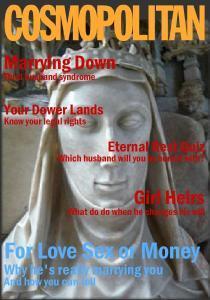
One for all the widows.
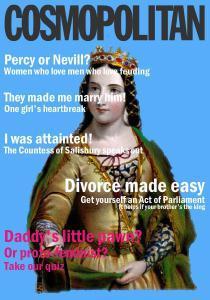
Anne Nevill, Princess of Wales, Duchess of Gloucester, Queen of England, Cosmo cover girl
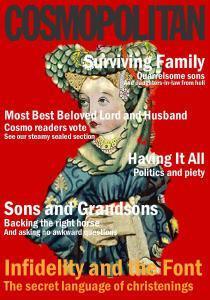
Rose of Raby issue
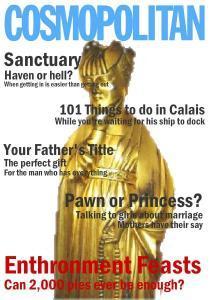
Countess of Warwick issue
Susan Higganbotham’s got some Cosmo girls as well. Check them out!


June 12, 2012
Twenty chapters
I feel that I should take a moment to draw a breath. Twenty chapters to revised draft. Fifteen to go. Nearly 90,000 words.
I haven’t covered much in terms of time, 1453-1455, the last fifteen chapters will take me to 1461. A lot happened in those few years, and Thomas was up to his neck in it. Stuff was going on in Maud’s life as well. Another chapter or two and there’ll be a bit of a break till 1457. The detail of their lives falls away at this point. Thomas, it would seem, was deputising for his brother in the Marches, Maud either enjoying or still fighting for her dower lands. As I still don’t know when she got custody of these, I’ve made a more or less educated guess and had it all sorted in the early months of 1455. The minute something comes to hand to change that… *sigh* Another redraft, or at least the shifting and slight changing to a chapter or two.
My most momentous achievement so far is wresting the St Albans chapter from Warwick’s hands. He didn’t want to give it up, but since I decided to restructure the book into four and pare back the voices to two in each, I had no choice. He’ll get his chance. He can have the second battle of St Albans if he likes. (I shall pay for that, no doubt!)
I’m feeling quite pleased with how things are going at the moment, but that could change in a heartbeat. My decision to alternate Thomas and Maud’s voices seems to be working. I don’t want to tie poor Maud in knots getting her to somehow tell his part of the story, and her voice, her part of the story, is pretty compelling to me as it is. I’m hoping I’ve been able to reflect that.
There’s still a lot of work to be done, and not just the last fifteen chapters (three of which have at least some words in them already), but the editing/revising/editing cycle. So, after another few moments of rest and mild self-congratulation, I’ve got a wedding to write.


Historical accuracy in fiction: more than just potatoes
Somewhere between the crowd with the banners screaming ‘IT’S FICTION!’ and the mob with the ones emblazoned ‘IT’S HISTORICAL!’ is a middle ground where most good, rational writers with integrity and respect for their readers stand. Of course there has to be ‘fiction’ in historical fiction. I’ve said this before, I’m sure I have: conversations, relationships, the actual writing of actual events, people’s thoughts and motivations – all these are fictional, even if the events themselves, or the people, or the marriages, or their actions, aren’t.
There’s been smattering of blog posts about this lately, and they all seem to say similar things. The same kind of things that I’ve been saying, but…
There seems to be something of an obsession with potatoes! Now, I understand this to an extent. The latent (and sometimes not so) pedant in me sometimes silently screams at incorrect detail. I get this from my father. There used to be a tv show here in Australia called… oh, something Force, kind of a war drama, with spies, I think, something like that, anyway. Well, my Dad, who was in signals during the War, *sigh* the Second World War, got up and left the room in disgust at one point, vowing never to watching Something Force ever again. “They didn’t have that kind of receiver in 1943. Those weren’t made until the 50s.” No point explaining to him that maybe the props department had done their best. No, he was through with Whatever it Was Force and never watched it again, despite having enjoyed it – with no complaints – up to that point. (We didn’t have a television in our house until we were well into our teens. I just think Dad never quite got the hang of it.)
But that brings me to my point about potatoes. These emblematic tubers are so often called into action in discussions about historical accuracy. “When I see a Norman sit down to a plate of roast beef and mashed potatoes, I put the book down in disgust” kind of thing. Well, it would certainly make me blink and look twice, and possibly (if it was close to the beginning) proceed with caution, but I wouldn’t quite write the book off just yet. I’ll certainly forgive an anachronistic serving of potatoes before I’ll forgive an event moved out of its proper time, or a man with no hint of scandal attached to his name turned into a violent brute, or a queen passing off her secret lover’s child as her husband’s. But I might just be a bit trepidatious for a while after that particular meal.
When I talk about historical accuracy, it’s not these little details that bother me. For other people it is exactly these little details. For yet others it’s both the big things and the little. Sure, I think I’d get a bit irritated with a 15th century family who sat down to a hearty serving of spuds every night, but the occasional lapse can be forgiven. I think it’s because I’m not a details person in the first place. Intricate, down to the last seed pearl, descriptions of clothes have me skipping paragraphs, the same goes for rooms and wooden doors (the first 10 pages of The Name of the Rose, iirc). Other people love this, can’t get enough of it. “I loved the descriptions of the clothes,” they’ll write in a review, “right down to the last seed pearl!” I wouldn’t mention that in a review coz while I don’t revel in it, it probably wouldn’t stop me enjoying a well written book – no need to mention it. (I was going to writher ‘otherwise well written’, but this is an opinion piece and my opinion about excruciating detail doesn’t render it bad writing.)
What will turn me off a book is inaccuracy in the big things. Events moved in time and space; people being where (according to known records) they weren’t; adulterous love affairs conjured out of thin air… What’s the odd potato or two in face of that?
What all this tells me isn’t that my opinion is correct and everyone else is wrong. No, what it tells me is that the world is full of all kinds of people with all kinds of taste, preferences and opinions. ‘I don’t care about the history, I just want a good story,’ the IT”S FICTION! crowd might say. And ‘I hate it when the writer deviates one iota from what is known,’ the IT’S HISTORICAL! posse might say. What I say is: Please don’t disrespect the lives of the people you’re writing about. Please don’t think you can rearrange those lives to better fit the story you want to tell. If you think you have a better story in you than the ‘real’ one (‘real’ being a non-finite term when it comes to all kinds of things, including history and reality), then write it, but please try and resist telling everyone that it’s any kind of accurate.
Oh, and stuff about language, but it’s probably best not to get me started on that…


June 8, 2012
Things are crook on facebook
Well, it’s been a torrid couple of weeks on Facebook, particularly among the historical fiction sorority. I don’t mean to ignore the few men who have had their say, but it has been predominately between women. What it boils down to, for me, is that some people react strongly when challenged. They might claim that there are two-sides to an argument, but their actions don’t in any way support this. They are defensive in the extreme and resort, sooner or later, to the personal. Well, I’ve had enough. And I’m not the only one.
First, in a discussion about the Akashic Record, those of us who dared to question the validity of this kind of thing, who talked about cold readings, who suggested that the little insights ‘discovered’ by the Akashic reader were in fact prompted and supplied by the writers themselves, who did all this politely, dispassionately and intelligently, were accused of making ‘personal attacks’ and being close minded. To cap it all off, the person who began this discussion deleted the thread from facebook, moved it to her blog and made access to it by invitation only.
Next came the attacks on a writer of historical romances, Katharine Ashe. Her books might not be my cup of tea, but they sell well, from the bits I’ve peeked at seem to be written well and, as she’s a history teacher, I’m guessing she pays close attention to the historical background. I don’t read historical romance, but I don’t look down on those who do, or those who write it. This woman’s work was, publicly and often, referred to as ‘trash’, she was accused of ‘churning’ it out, it was assumed that her books are full of anatomically correct, graphic sex. Now I don’t know if they are and, frankly, don’t care. The reason for this deeply uncourteous behaviour? Katharine Ashe has the temerity to have a name very similar to another writer. That writer doesn’t like this, not one little bit! Katharine Ashe has no reason to exist and, because of her and (apparently) Rupert Murdoch’s publicity machine, the work of the other writer of similar name was being ‘suppressed’. Harden up, princess! Try having the 8th most common British surname for a while, try scrolling through page after page of google searches to find yourself. That’s what I have to do, but I don’t bitch about it or take it out, viciously, on someone else. It’s just the way things are.
Then there was the well known internet troll who screeched at me, swore at me, called me a liar, told both me and a friend of mine that we were ‘ugly pigs’, continued to screech and swear despite being asked not to, and destroyed what was a very nice post from a rather nice person. Here’s a little sample of his work: “I almost forgot, you silly women are the most b-o-r-i-n-g group of writers that I have ever seen. No wonder that you don’t sell anything and I haven’t heard of even one of you.” Here’s another: “Then don’t make snottyassed statements aimed at demeaning my ancestry. You know nothing about me and you make yet another smart assed remark. Who in the fuck are you anyway? Just shut your yap and you won’t be bothered. You started this for no fuckin reason so don’t cry about me lady!” Charming!
I almost entirely forgot one bizarre response to our Don’t Defame the Dead! campaign. Someone (one of the people who got quite personal on the Akashic thread, as it happens) suggested that it was but a small step from this to banning and burning books. Yes, that’s what the microscopic fine print on all those cards says… Burn Books Now! You might have missed it… The Don’t Defame the Dead! campaign wasn’t any kind of deliberate decision. Kathryn Warner made a card and I made a card and before we knew it there were Don’t Defame The Dead! posts on at least five blogs. All of them were prompted by some of the nonsense we come across not only in novels but occasionally even in works of non-fiction. The leap from there to suggesting that we were advocating banning or burning books was breathless and spectacular – as leaps to entirely erroneous conclusions often are. We’d just like it if writers were a little more careful, that’s all.
The latest bout of insanity, for which I and several other people were Banished Forever from the facebook presence of another writher, is still echoing across cyberspace. A claim was made about the parentage – specifically the father – of an English king. Those who know about that time questioned this person. “What is your source?” they asked. Now, you’d think that, of all the questions in the world, this one wouldn’t be particularly problematic. I’m more than happy for people to ask me for sources and I’m happy to provide them. If I make an assertion that’s contradicted by the sources, or isn’t in the one I thought it was in, then I accept that I got it wrong. I don’t get defensive and try to shout the challenger down. And I don’t unfriend and block them. But that’s what happened to me and several other people. It’s quite simple really – if a writer isn’t prepared to defend their work, maybe they should stop pretending it’s historically accurate. “I made that up because it fit my story better” might be a blow to someone’s histcred, but at least it’s honest.
A lot of discussion about history is debate. Debate isn’t someone saying something to the ooohs and aaaaahs of those who hear it. Debate is about backing up what you say, defending your assertions, conceding ground if necessary and learning something. Debate is about having ideas that can be confirmed, supported, altered or discarded as the case may be. For instance, I am currently of the view that the illegitimate daughter often ascribed to George Nevill, Archbishop of York, may in fact be the illegitimate daughter of his uncle, George Nevill Lord Latimer. My reason for this… yes, it’s a guess right now… is that future archbishop George would have been around 14 at the time of her birth. Not impossible, but unlikely. Now if someone shows me a source that clearly shows that future archbishop George was her Dad, I won’t be furious that I’m wrong. No, I’ll be delighted to finally know the truth of it. So, I’m always surprised when people attempt to shut down debate when asked for a source. There is a connection between knowing how to engage in a debate and academic experience. Not that those with none are incapable of it, but those who have studied or taught in a university really ought to know how to. Looking down your nose and saying, “Just believe me, challenger, as my fawning fanpoodles do!” isn’t any part of debate as I know it. And if a writer sets themselves up to be better than others, then they sure as hell had better back that up.
So, politely challenging the nonsense of ‘psychics’ and the con that is the Akashic Record is ‘disrupting the conversation’; having a similar name to another less successful (but more ego driven) writer is grounds for being publicly insulted; stating something that you know to be true (and can back up) gives trolls the right to swear at you and call you names; asking a writer of historical fiction for a source to back up an extraordinary claim is to ‘pillory’ that person; and the way to win an argument is to block everyone who disagrees with you… So many new things to learn about the world of facebook. And writers of historical fiction. And trolls.
An important contribution to this discussion from Hannah Stewart, can be found here.


June 1, 2012
Don’t Defame the Dead!
Welcome to Don’t Defame the Dead!: Nevill.
Elizabeth Wydeville – a commoner! – had the temerity to marry a king. And she is portrayed in all kinds of negative ways. Grasping; greedy; jealous; manipulative; spiteful… In one book. the Too Good to be True Heroine catches her mocking a fat servant (and that was before she married her king!) Now, I’m contractually obligated to hate the Wydevilles for the duration, but I’ve been give a day’s reprieve, so I’ll make the most of it. Edward IV was the one whose actions were dubious. He had no business (from the perspective that a king’s marriage was about more than personal choice, it was about politics, alliances and other stuff) marrying Elizabeth. A lifelong commitment might not have been his first consideration. So, what was Elizabeth supposed to do in that case? Say, “Oh, I’m far too lowly and humble to be your queen! Please, by all means, sleep with me for as long as you want, then walk away.” Or perhaps, “Oh, don’t worry about the wedding thing! I understand. Off you go. It’s been such fun!”
I can’t think of one book featuring the countess of Warwick where she is not in some way terrified of her husband. Strange, then, how she chose to be with him just about every second of their marriage. She went with him to Calais, though she is reported to have hated the place; she shared with him his last exile, arriving back in England on 14 April 1471 to the news that he was dead. Waurin reports (twice) that she greeted him with joy on his safe return to Calais.
It was a father’s duty to find the best marriage partners for their children. Best not just for their children but for the family in general. No child expected to marry for love. Warwick found a Duke for his elder daughter and a Prince of Wales for the younger. Advantageous to him, both of them, yes. But utterly advantageous to the young women themselves.
Hunchbacked, withered armed Richard III, anyone?
When forced to flee England in 1471, Warwick made sure his wife and daughters were with him. “Showing scant regard for his womenfolk” a lot of historians (and others) say. Leaving his family behind to be left in poverty, possibly homeless, potentially hostages, would have shown a good deal less regard for ‘his womenfolk’ (perhaps better to say his wife and daughters?) than collecting them, making sure all were together and hightailing it to Calais. I think this is mostly based on the Duchess of Clarence’s advanced pregnancy. But Warwick wasn’t to know he’d be kept out of Calais, nor was he to know that isobel would go into labour aboard ship to a deeply sad outcome. I can’t imagine a darker time for the family, burying a baby boy at sea. This was Warwick’s first grandchild, and to suggest he simply didn’t care is monstrous. Give the man a break!
The Wydevills weren’t the only ones tagged as ‘grasping’ and ‘greedy’, the Nevills are as well, particularly Warwick. He held a lot of well rewarded posts – Captain of Calais, Keeper of the Seas, Warden of the Cinq Ports, Warden of the Marches towards Scotland… And he worked hard at all of them, didn’t just sit back and wait for the cash to drop into the palm of his hand. Did Edward rely on him too much? Certainly at the start. But as time went on, he ended up relying on him too little. And that was a bad mistake.
Based on one report from Warkworth, John Nevill is forever branded as a man prepared to betray his brother. And yet he is lauded for that, treated like a hero. I don’t understand that at all. (I’ve blogged it.)
Susan Higginbotham says this better.
A couple of times during the Wars of the Roses, scurrilous rumours sprang up that Edward IV was not the son of the Duke of York at all, but an archer named Blaybourne. Tony Robinson and Michael Jones stirred the pot with their ‘documentary’ about it. A lot of people are convinced of the truth of it. The evidence for it is flimsy and circumstantial. The evidence against it rests on a number of things, not the least being the Duke of York’s treatment of this supposed archer’s son. “But he had a tiny little christening!” people say. “Not like his little brother Edmund!” So the Duke of York, faced with his wife’s illgotten offspring, puts his foot down. He would acknowledge the boy as his (he didn’t actually, there was no need), treat him like his son and heir, mark no difrerence between him and the other children, BUT… He wasn’t going to get a fancy christening! It’s nonsense.
There was a belief in witchcraft in the 15th century, and people did get accused of practicing it. Jacquetta Wydeville did, and was acquitted. So there’s no problem portraying characters who believe in witches, or even believe they are witches. But to actually endow them with magical powers? Pffff!
George Nevill’s enthronement feast as Archbishop of York is often cited as an example of excess: excess and oneupmanship. I’ve blogged it.
 Just a general plea: Don’t Defame Daddy! Marriage for love was not only uncommon bur greeted with shock or scorn in the 15th century. Daughters were more likely to be totting up their future worth when Daddy suggested young Lord So-and-So or the widowed and ageing Earl of Thing, Widowed and ageing might have its disadvantages, sure, but there was always wealthy widowhood to look forward to. Please don’t feel sorry for these non-21st century girls. Their husbands didn’t have much choice either!
Just a general plea: Don’t Defame Daddy! Marriage for love was not only uncommon bur greeted with shock or scorn in the 15th century. Daughters were more likely to be totting up their future worth when Daddy suggested young Lord So-and-So or the widowed and ageing Earl of Thing, Widowed and ageing might have its disadvantages, sure, but there was always wealthy widowhood to look forward to. Please don’t feel sorry for these non-21st century girls. Their husbands didn’t have much choice either!
And here are the ‘greedy’ ‘grasping’ Wydevilles. Looking after their own interests in the same way other, more established, families did. Some of it wasn’t nice, viz Anthony Wydeville’s treatment of Maud Stanhope, but he wasn’t inventing anything new there. Sure, people looked down on them, called them upstarts, moaned about how they were nicking all the good marriages. Unless one of those good marriages went in their favour – a connection with the king wasn’t to be sneezed at.
“You’re going to marry the Prince of Wales.” “But I don’t love him, Papa!” or “You’re going to marry the Duke of Clarence.” “But I don’t love him, Papa!” Actually, there’s every reason to think that, by the time of their wedding, Isobel Nevill and the Duke of Clarence were more than happy with the marriage, from a personal perspective as well as the usual. Her father seems to have given them the opportunity to develop a friendship, if nothing else. As for Anne’s marriage to a Prince of Wales! One whose exile Daddy was working hard to bring to an end, one who Daddy was going to do everything he could to restore to his birthright. Yes, these marriages were advantageous to Warwick, but all medieval noble marriages were meant to be that. Please, stop calling them pawns.
Guess who says this better?
Weak, pale, fragile, DOOMED Anne Nevill… She’s in all the books. There’s no evidence of her in real life. So sad that she died so young, and Isobel as well, and so sad that her only son died even younger. People did. They died young a lot. It’s why we have the myth that ’60 was seen as ancient’. It wasn’t.
I’ve seen Warwick described as ‘a notable failure as a general’. His thinking was certainly a little too defensive at times – like 2nd St Albans – but just think how he’d be hailed now if he’d got the line of the enemy army’s advance right! A military genius! Innovative with defences! He wasn’t the finest general during the Wars, but he wasn’t a military dunce, either.
This is Alice Montacute, Countess of Salisbury. And, yes, she really did look like that! I’ve seen her portrayed as a helpless whimpering swooning nellie, her part in the Wars ignored, her attainder given to someone else, and I STILL DON’T KNOW WHY! Women’s history is ignored enough without this kind of nonsense.
I’ve seen it in novels, suggested in serious works of non-fiction, listed as fact in material for the study of history. And it’s not only not supported by the sources, there’s clear evidence that the contrary applied. The Duke of Clarence grieved deeply when his duchess died. He went off the rails. Yes, he’d done some dumb things in the past, but if there’s no evidence that a man was a hopeless drunk who physically abused his wife, why say it?
The Countess of Warwick was stripped of her lands and titles after her husband’s death at Barnet. Illegally. She wasn’t ‘rescued’ by her son-in-law, the Duke of Gloucester, and taken to live a life of ease and comfort in ‘her favourite castle’. The burden of taking care of her wealth and lands wasn’t gently eased from her helpless trembling hands. She was Countess of Warwick in her own right. Neither she nor her husband were attainted for treason. She really was declared dead in parliament. This was an illegal act. Turning it into a kindness is (I’ve used this word a couple of times, I think) nonsense.
And maybe this is what we all need to remember!
Please don’t forget to visit Don’t Defame the Dead!: Edward II.
The cards were created here: http://www.someecards.com/


May 29, 2012
From: Blacberyes in tyme of yere
One of my favourite scenes. I’m very pleased with the way this has turned out.
* * * * *
When the plates and cups were cleared, the table and the leftover food packed onto the cart, Lady Scrope opened a book and began to read.
Ailie’s breathing slowed. The Countess’s head fell back and she closed her eyes. The children settled down around Mistress Kendall. Maud was halfway to sleep herself when Alison jumped up.
“Blackberries! We’ve forgotten the blackberries!”
The Countess opened one eye. “Don’t take them too far, Kendall.”
Baskets were fetched from the cart and the girls’ hands and faces cleaned. Maud stood up and stretched her back.
“I’ll come with you. If you’ll not think me in the way.”
“Not at all, Lady Willoughby,” Mistress Kendall said. “The best ones are just along the hedgegrow. Master Palfreyman was telling me.”
The Countess opened the other eye. “Was he now?”
“Come, girls. Katie, you can show Lady Willoughby the way.”
Maud followed them away from the river to the border of a meadow.
“Let’s see who can get the most,” Margaret said.
“Don’t forget to whistle while you pick,” Katheryn said.
Alison nodded solemnly before making an attempt that reduced them all to helpless laughter.
Despite the lateness of the season, there were berries aplenty, hidden deep in the bramble thickets. Maud pulled aside the thorny branches, catching her sleeves and scratching her hands. She filled her basket and her belly quickly and sat down in the grass, watching the girls, their mouths and hands stained with juice.
“Don’t forget,” she said, “we have to take some back for the others.”
“This might be the last time Katie does this,” Mistress Kendall said.
“It’s the way of things.”
“It is, my lady. And I’m pleased for them, of course, just a little sad for myself. I’ve been with them fifteen years. A nursemaid comes to love her charges.”
“Thomas was eight,” Maud said. “I try to imagine the child he must have been.”
“A wicked boy!” Mistress Kendall laughed. “They all were, thinking they could get around everyone with a smile and a kiss. Fine young men now, so we must have done something right. I wasn’t much more than a girl myself. I’ve known Meggie since she was a baby. I shall have to stop calling her that soon, I suppose.”
They watched as the girls drifted further away, moving together, methodically stripping the fruit before moving on.
“Like a set of steps,” Maud said. “Katheryn up high, Alison low and Margaret in the middle.”
“You’ll be blessed soon, my lady. Perhaps if you would think of me…”
“I shall be advised by the Countess.” Maud smiled at Mistress Kendall. “Fifteen years is a fine recommendation.”
She stretched her legs out in front of her and leaned back on her elbows, tilting her head up to catch the sun on her face. The men would be back soon, whole and safe, their enemies vanquished. Or Salisbury would have his sons by the throat, one in each hand, chastened and subdued. Ailie would take Fitzhugh aside and question him mercilessly, tearing the whole story from his lips, word by word. The Countess would greet the Earl with an affectionate kiss and Maud… Maud would take Thomas by the hand and lead him to their bed.
A cry from one of the girls, and she opened her eyes and sat up. They were on their way back, Margaret in the lead, holding up an arm and crying. Katheryn was behind her, burdened by two baskets, looking over her shoulder to make sure Alison followed. Mistress Kendall ran to her charges and inspected Margaret’s wounded arm. Alison skipped over to where Maud sat. She put down her basket and dropped to her knees.
“That’s a lot of blackberries,” she said with a deep sigh.
“It certainly is!” Maud looked at her face. It was stained with sticky juice. “Looks like you’ve eaten a lot as well.”
“There were so many! And my hands just wouldn’t listen.” Alison spread her arms wide and shrugged her shoulders. “Put them in the basket! I said, but they just kept on popping them into my mouth.”
“Like this?” Maud took a handful and ate them.
“No!” Alison snatched the basket up so quickly that she spilled several berries onto the grass. She looked at them in horror, then at Maud in accusation. “I’ll have to go and get some more now!”
Maud scooped up some of her own berries and dropped them into the child’s basket. “Here, that should make up for what I stole.”
“And Grandma will be cross with you!”
“That’s all right. I can deal with Grandma.”
“Margaret hurt herself.” Katheryn dropped the baskets she carried and sat down beside Alison. “Such a baby!”
Margaret’s sleeve was pushed back to her elbow. She peered at the wound, her brows furrowed, as Mistress Kendall attended to it.
“It must have hurt,” Maud said.
“I thought she was half dead, the way she squawked,” Katheryn said.
Her tears dried and the pain almost forgotten, Margaret ran to where they sat, her nurse close behind.
“Just a scratch,” Mistress Kendall said. “We’d best get her back to her mother so she can chide me.”
Margaret showed Maud her arm, wrapped in a kerchief, the blood already starting to seep through. “Mother won’t chide you, Kendall. She’ll just tell me I should be more careful. It does sting!” She looked at Katheryn with accusing eyes. “You’d have squawked, too!”
Maud picked up her basket and Margaret’s and they started back. It had been a lovely afternoon, the cares of the world lifted from the women’s shoulders. A feast of blackberries would be its perfect end.
“Just look at your faces!” the Countess said when she saw them. “Did you bring any for us?”
“There’s plenty.” Maud set the baskets down. “Sweet and juicy.”
“Meggie hurt herself,” Katheryn said.
“Not too badly, my lady.” Kendall said quickly. “No more than a scratch.”
The Countess glared at Margaret, once again close to tears, this time at the depth of her sister’s betrayal.
“Show me!”
Her feet dragging, Margaret obeyed her mother. The Countess pushed the child’s sleeve up and unwrapped the kerchief.
“You’ll live,” she said. “Next time be more careful. I’m sure Kendall will be.”
Alison distributed the baskets among the women, making sure that her own ended up with her mother. The Countess took the handful Katheryn offered and ate them slowly, one at a time.
“We should start back soon,” Ailie said. “They might be home.”
“Take the girls to the river, Kendall, and wash their hands and faces.” The Countess looked at Maud. “And do the same for Lady Willoughby while you’re about it.”
The men weren’t home when they got back to the castle.


May 27, 2012
York’s parliamentary pardon
An indispensable site for anyone researching the Wars of the Roses: British History Online. Here you can find, among other things, the Rolls of Parliament for the reigns of Henry VI, Edward IV and Richard III. There’s a lot you can access for free, but getting the full benefit of it costs around £36 a year. I really can’t do without it.
Immediately after the first battle of St Albans, York, Salisbury and Warwick attended the King in his quarters at St Albans Abbey. Abbot Whetehamstede gives York a hell of a speech denouncing the dead Somerset and urging Henry to ‘rejoice’ at both Somerset’s death and York’s triumph. “I am, and always was, and all my followers are and were your faithful – indeed, your most faithful – liegemen; and we will always remain…” York had been insisting the truth of this for some years now, so determined to get his point across that twice he stood with a sizeable band of armed men, demanding to be given access to the king.
What Henry VI must have gone through in the brief half hour of battle proper… Having already suffered a breakdown that left him uncommunicative and insensible for more than a year, his mental state was perhaps not fragile but at least vulnerable. He’s often seen (and portrayed) as a puppet, carried along by his favourites and chief councillors, Somerset among then, reacting to the things that happened, believing the last man who spoke to him. York certainly chose to promote the view that, before the battle, Henry was deliberately kept in the dark, the letters sent to him from Royston and Ware kept out of his hands. There’s an alternate reading to this. In the Stow Relation (from Boardman, The Battle of St Albans 1455, p112) strong words are put into Henry’s mouth in response to York’s demands:
I, king Henry, charge and commaunde that no maner personne of what degree, astate or condicion that ever he be, abide nat but that they avoide the fielde and noughte to be so hardy to make resistence ageinste me in myn owne reaume. For I shall knowe what traitor dare be so bolde tareise any people in myn owne lande, wherthroughe I am in grete disease and hevines [heaviness]. Be that feithe I owe unto Seint Edward and unto the crowne of England, I shall destroye hem every moderis sone, And eke they to be hanged, drawen and quartered that maybe takyn aftirwarde of theim inensaumple to make all such traitors to be ware forto make eny rising of people withinne myn owne lande and so traitorously tabide theire king and gouvernor. And for aconclusion, rather thanne they shall have eny lorde that there is with me at this tyme, I shall this day for theire sake in this quarrel my selfe lyve and dye.”
These sounds like the words of a King who knows what’s going in and is very much in his right mind. By the time the battle was done, Henry’s mental state seems to have deteriorated. It’s hardly surprising. With Warwick’s northern archers, led by sir Robert Ogle, firing into the market square, Warwick and his men not far behind, York and Salisbury assaulting the barricades across Sopwell and Shropshire Lanes, his own men desperately scrambling into armour and the royal standard – which should have made him safe – thrown down in the confusion, an arrow wound in the neck, being bustled into a nearby house for safety… By the time York found him, whether he gave the speech Whetehamstede credits him with or not, it’s hardly surprising that Henry responded the way he did. “There were rebels in the town,” York says, more or less, “but we dealt with them for you.”
The following month in parliament, York, Salisbury and Warwick made a declaration excusing themselves entirely of blame for anything that happened at St Albans, transferring the fault onto the shoulders for three men: the late Duke of Somerset, Thomas Thorpe and William Joseph. These three had, according to York:
“entendyng as it is supposed to the hurte and destruction of oure true right trusty and well beloved cousyns, Richard duc of York, Richard erle of Warrewik, and Richard erle of Salisbury, and of theire heires; moved and sollicited us by diverse meanes to mistruste oure seid cousyns, and to instraunge theym from oure favour and good grace affermyng theym not oure true liege men, and therefore provoked and stired us to have proceeded with grete might of people under colour of oure matiers, where noon we hadde, to the avaunsyng of theire owne matiers and quarelles. Oure said cousyns understandyng and consideryng, as they saye, the labours made ayenst theym, and that the said Edmunde, Thomas, and William, for thexecution of theire entent, enforced thaim with grete might of men in diverse countreyes, moche harneys and grete habilmentes of werre, addressed thaim toward oure presence, to declare theim oure true liegmen, the better accompanyed for theire suertee, and to resiste such malice as they verrely demed was purposed to have been executed ayenst theim, at thaire commyng unto us, by the seid Edmunde, Thomas and William, and for noon other cause; and to thentent that we shuld not wondre nor mervaille of the commyng of oure said cousyns aforereherced toward us, nor of the manere therof, nor have any suspecion or mystrust therof toward oure persone, they wrote thaire lettres at Roiston the .xx. day of May last passed, and thaim sent afore thaire commyng unto us, for thaire declaracion and desire, to the most reverend fadre in God Thomas archiebishop of Caunterbury, oure chaunceller of Englond, to be by hym openned unto us, whereof thendorsment and teneur foloweth hereafter:”
These letters “were never openned or declared unto us, afore the commyng of oure said cousyns to the side of the toune of Seint Albone, the .xxij. day of May last passed, we than beyng within the same toune, but from us to that tyme kept by the seid Edmunde, Thomas and William”.
York, therefore, had no choice but to do what he did:
“And the said .xxij. day, oure said cousins heryng of oure beyng in the said towne of Seint Albone, come thider desiryng in full lowly wyse to have hadde knowlache of oure entent and pleasire of thaire demeanyng, touchyng the matier in thaire said lettres, to us by thaim the said .xxij. day afore sent, and to come to oure presence to declare thaim as above it is specified. Whereunto aboute .xij. of the clocke of that same day, by thavis of the said Edmunde, Thomas Thorp and William Joseph, it was as we conceyve withoute oure knoweleche answered unto thaim that than we had not seen the same lettres; wheruppon oure said cousins, demyng as we nowe conceyve and understond for trouth, that the same lettres shold be by the seid Edmunde, Thomas Thorp and William Joseph that were thanne there aboute us kept from us, to the entent that we shuld not knowe the true and feithfull disposition of the same oure cousins toward us and oure estate, profered theim self to entree into the same towne, to come to oure presence for thaire said declaracion.”
There seems to be no doubt in the minds of anyone, then or now, that the Yorkists – specifically Warwick – attacked first. The king, however, has allowed himself to be convinced otherwise. Not a month after the battle, a different version of events is enshrined in the parliamentary roll:
“And the said Edmunde, Thomas Thorp and William Joseph, with grete multitude of people to thaim assembled, defensably arraied, to the entent to let oure said cousins to come to oure < presence, and > thaim to destroie and slee, opennely saiyng and callyng thaime fals traitours to us, and that they shuld dye as traitours, thenne and there sore assaulted oure said cousins in the said entre into the said towne”
York, Salisbury and Warwick were entirely blameless and the king was happy to let everyone know:
“We therfore consideryng the premisses, declare, repute, accepte, hold and approve oure said cousins, and all thoo persones that comme with thaim in thaire felaship to the said towne of Seint Albone, the said .xxij. day, and all < other persones that > thaim or any of thaim have assisted, stired, helped, conforted or counseilled, oure true and feithfull liegmen; and woll that thurgh all oure said reaume by all oure people of the same, they and ichoon of theim be soo taken, reputed, accepted, holden and approved.”
And:
“that noon of oure said cousins, the duc of York, and erles of Warwic and Salisbury, nor noon of the said persones commyng or beyng with thaim, nor noon of thaire said assistours, helpours, stirrers, confortours or counseillours, ner noon of any of thaire heires, of ner for any thyng supposed or pretended to be doon to or ayenst oure persone, corone or dignitte, be empeched, sued, vexed, greved, hurt or molested in thaire bodies, landes or goodes, in anywyse. And over that, we woll by the said advis and auctoritee, that noon of oure said cousins, ner noon of the said persones commyng with thaim to the said toune of Seint Albone, ner noon of thaire said assistours, helpours, sturrers, counseillours or confortours, ner noon of any of thaire heires, of ner for any thyng that happened the said .xxij. day to falle or be doon at the said towne of Seint Albone, be empeched, sued, greved, vexed, hurt or molested in thaire bodies, goodes or landes, in anywyse.”
That was that. Sorted. What would have been seen and treated as treason by a stronger king was altered, by some particularly beautiful Double Speak, into a triumph for the rebels. A new need for a Protector was identified and York was, once again, appointed and the lords spiritual and temporal turned their attention to the always pressing matter of Calais. Yorkist propaganda (which is a bit like Tudor Propaganda! only Yorkist) had been used to spectacular success.
First St Albans didn’t bring lasting success to York and his backers. He was again dismissed as Protector once Henry was more strong of mind. Four years later, York, Salisbury and Warwick were once again to gather together to make declarations of loyalty and write their manifestoes. This time, though short term disaster and exile were the result, the real triumph of spring 1455 was to benefit them. Of all that was achieved – the deaths of Somerset and Northumberland; the astonishing pardon of the Yorkists; York’s short term ascendancy – it was the appointment of Warwick as Captain of Calais that proved to be the master stroke. The Yorkists (and Warwick in his later rebellions) had a safe haven where they could regroup, arm and plan, and from where they could launch their invasion.
* * * * * *
Don’t forget to leave a comment here if you want the chance to win some books.















